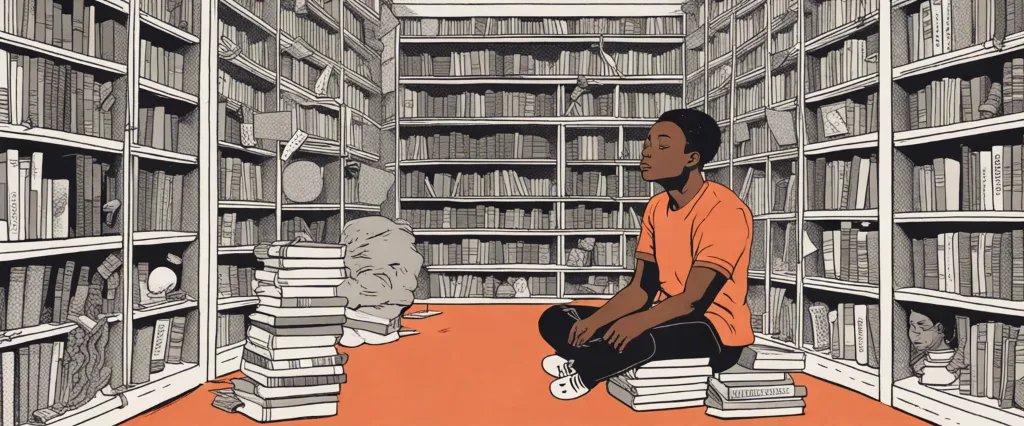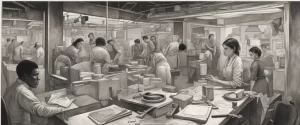
Books have always been a gateway to understanding the vast complexities of the world we inhabit. They provide us with profound insights, challenge our preconceptions, and urge us to question the established norms of society. In this comparative study, we set out to explore two influential works that tackle pertinent issues prevailing in our society today: “White Fragility” by Robin DiAngelo and “Excellent Sheep” by William Deresiewicz.
Both DiAngelo and Deresiewicz, with their distinct perspectives, shed light on the divergent aspects within our social fabric, unearthing the intricacies that often go unnoticed. White Fragility” delves deep into the complexities surrounding racial identity, primarily focusing on how white people respond to conversations regarding race. On the other hand, “Excellent Sheep” critically examines the hyper-competitive education system and its impact on young people, particularly those attending elite institutions.
The examination of these two works reveals the ways in which DiAngelo and Deresiewicz astutely identify their subjects’ blindspots and challenge readers to confront uncomfortable truths. By investigating the nuances and parallels between these books, we seek to unravel the interconnectedness of these issues and enlighten readers on the broader context these works collectively provide.
As we delve into the comparative analysis, it is crucial to acknowledge the growing need for these conversations within our society and the unprecedented cultural shift they represent. The inclusion of diverse perspectives and the examination of systemic flaws are fundamental to fostering meaningful dialogue and effecting positive societal change.
Within this study, we will explore the core themes, arguments, and strategies adopted by both authors as they navigate the intricate landscape of their respective subjects. Analyzing the methodology each writer employs, we will evaluate the effectiveness of their arguments and the potential implications they hold for everyday life.
Furthermore, we will explore the diverging opinions and overlap that may arise as these works examine the intricate web of race, identity, education, and societal norms. By closely examining the unique viewpoints presented by DiAngelo and Deresiewicz, we hope to unveil shared insights, challenge conventional approaches, and foster a broader understanding of the multifaceted nature of our society.
Through this comparative study, we aim to empower readers to critically engage with the topics at hand, confront their own biases, and consider alternative perspectives. In challenging the established norms regarding race and education, we have the potential to reshape the future and bridge the societal divides that persist.
As we embark on this intellectual journey, let us set aside preconceived notions and embark on a thorough examination of “White Fragility” and “Excellent Sheep.” Together, we shall uncover the hidden truths, explore the interconnections, and pave the way for a more inclusive, empathetic, and enlightened society.
Brief Summary of Two Books
White Fragility by Robin DiAngelo
“White Fragility” by Robin DiAngelo is a book that explores the concept of white fragility and its impact on racial dialogue and equality. DiAngelo, a white author and anti-racism educator, examines how white people often react defensively when their racial privilege and biases are challenged, thus hindering progress in achieving true racial equity. The book delves into the reasons behind white fragility, including societal conditioning and the avoidance of discomfort regarding race-related issues. DiAngelo also discusses common manifestations of white fragility, such as tears, silence, and intellectualizing. She emphasizes the importance of recognizing and confronting this fragility in order to work towards dismantling systems of racial oppression and fostering meaningful dialogue about race. Overall, “White Fragility” presents a critical analysis of white fragility as a barrier to racial progress and seeks to empower readers to actively engage in anti-racist work.
Excellent Sheep by William Deresiewicz
Comparison between Two Books

Similarities in Class
Both “White Fragility” by Robin DiAngelo and “Excellent Sheep” by William Deresiewicz address the issue of class, although from different perspectives.
In “White Fragility,” DiAngelo explores the ways in which white people, particularly those within the middle and upper classes, are often unaware of their own racial biases and the privileges afforded to them. She argues that white individuals who come from privileged backgrounds may be oblivious to the impact of their social and economic status on their perspectives and interactions with people from different racial backgrounds.
Similarly, in “Excellent Sheep,” Deresiewicz discusses the consequences of the highly competitive and elitist higher education system in the United States, primarily focusing on students from privileged backgrounds. He criticizes the culture within prestigious universities that fosters conformity, narrow-mindedness, and a lack of critical thinking. These traits, he argues, are often attributed to students from affluent backgrounds who have been groomed for success through a narrow definition of achievement that is connected to their privilege.
Although they approach the topic of class from different angles, both books highlight the inherent biases and blind spots that affluent individuals may possess due to their social and economic positions. They address the need for introspection, awareness, and a critical examination of privilege, whether it be racial or socio-economic, in order to foster greater inclusivity and equity in society.
Divergences in Class
White Fragility by Robin DiAngelo and Excellent Sheep by William Deresiewicz are two books that critically analyze different aspects of society, primarily focusing on race and education, respectively. While they address different topics, both books do discuss the issue of class to some extent. However, their perspectives on class diverge significantly.
In White Fragility, DiAngelo primarily examines the concept of whiteness and the inherent racism within society. While class is one aspect of privilege and oppression that she acknowledges, it is not the central focus of her work. DiAngelo argues that white fragility is a mechanism through which white people avoid engaging with issues of racial inequality and social justice. Class privilege is mentioned in relation to racial privilege, as she highlights how white individuals, regardless of their social class, still benefit from systemic racism.
On the other hand, Excellent Sheep explores the flaws within the higher education system and the impact it has on students’ personal and professional development. Deresiewicz delves deep into the culture of elite universities and the pressure on students to conform to the expectations of society, particularly those from wealthy backgrounds. Class plays a fundamental role in this book, as Deresiewicz emphasizes the divide between students from privileged backgrounds and those who come from more diverse economic circumstances. He argues that the focus on prestigious universities perpetuates a system that favors the wealthy and neglects the true purpose of education.
Therefore, the main divergence regarding class in these books lies in their overall focus and analysis. While DiAngelo acknowledges class privilege as a component of systemic racism, it is not her primary concern or central argument. She concentrates more on racial privilege and the concept of white fragility. Conversely, Deresiewicz predominantly examines class divisions in elite college systems, critiquing the effect of privilege on students’ experiences and personal growth.
In summary, White Fragility by Robin DiAngelo and Excellent Sheep by William Deresiewicz differ in their approach to class. DiAngelo’s work primarily focuses on the concept of race and white privilege, whereas Deresiewicz explores the impact of class divisions within the higher education system. Both books provide valuable insights into different aspects of society and contribute to the broader conversation about privilege and oppression.

Conclusion
Both White Fragility by Robin DiAngelo and Excellent Sheep by William Deresiewicz are highly regarded books that address critical issues in society. However, the most suitable book for you to read depends on your personal interests and the specific subjects you wish to explore.
White Fragility” is a powerful examination of how white people often react defensively and avoid engaging with discussions about race. It delves into the concept of white privilege and highlights the challenges and discomfort that can arise when discussing racism. This book is particularly relevant for individuals interested in understanding systemic racism, racial justice, and fostering conversations around these topics.
On the other hand, “Excellent Sheep” offers a thought-provoking critique of the education system and its effect on young people. It explores how a narrow focus on academic achievement and prestige can hinder personal growth and overall societal well-being. If you are interested in educational reform, questioning societal expectations, or exploring alternative paths to success, “Excellent Sheep” may be more suitable.
Ultimately, both books provide valuable insights into important societal issues, so it is advisable to prioritize the book that aligns more with your personal interests and the topics you are eager to explore.


